People can do many things to influence their feelings. Positive people focus on appreciation and action, for example, rather than angst.
They choose to appreciate life and have a sense of gratitude. Such people also choose to act if they find something disturbing, rather than dwell in misery.
Feeling, talking and doing are connected. So where can you intervene in the circle?
Some people, for example, love to talk about how bad they feel. Sometimes the best way to change a feeling, however, is by doing something different.
This was demonstrated by an exchange I heard in a therapeutic community I ran for young people.
“I feel really bad,” said one resident.
“That is probably because you are doing bad things,” retorted another young person. “If you want to feel good, do good things.”
Sounds simplistic? Perhaps, but it was the approach we took in the community.
Recognising The Circle of
Feeling, Talking and Doing
Many people know how to make themselves feel good. They know it is important to eat healthy food, follow their values, overcome setbacks and enjoy a feeling of success.
People also know how to make themselves feel bad. They can choose to neglect their health, have a negative attitude and develop a victim mentality.
People want to make sense of their experience. They can do this by talking, thinking, writing or whatever. Clarifying what has happened and the possible ways forward can help them to shape their futures.
Reflecting is vital, but then comes the crunch. Some people substitute talking for action. They may find that their analysis leads to a downwards spiral. They may say, for example:
“Why can’t I do something? Before I move forward, I must understand the barriers stopping me.
If they feel overcome by problems, however, there is a quick way to change that feeling. They can do something that will encourage themselves or other people. This often helps them to feel better.
If you wish, try tackling the exercise on this theme. This invites you to do the following things.
Describe a specific situation in the past when you chose to do certain things in order to feel healthier or happier.
Describe the specific things you did then to feel healthier or happier.
Describe the specific things that happened as a result of taking these steps.
During the 1960s I ran a community for former drug addicts. Part of my education was to become a resident at a recovery unit for addicts. This involved me being treated by the other residents as though I was an addict.
The community was based on the idea that we had each learned certain behaviours that provided us with pay offs. The pay offs of avoiding responsibility by taking drugs were:
Getting temporarily high.
Having a constant purpose, such as seeking money for the next fix.
Having a group of friends with a common interest and language, mostly associated with drugs.
Avoiding difficult feelings by taking drugs.
Having a life excuse for avoiding responsibility, such as saying: “My parents did not love me. Society is bad. Everybody wants me to be normal, but I want to be different.”
The community believed that change called for doing several things.
To be committed to behaving responsibly.
To get into the habit of behaving responsibly.
To get better benefits by behaving responsibly.
The final part was vital. People are prepared to change if they feel a new approach enables them to be more successful. Sounds simple in theory, but how to do it in practice?
The ‘Act as if’ approach
to getting better benefits
The community had a guiding motto: ‘Act as if.’ In other words:
“You may not be responsible and kind, but act as if you are. When you are in the community, take responsibility and help other people.
“Behave in this way and taste the benefits. You may feel cleaner and healthier. You may also feel better about yourself.
“This is the way we expect you to behave when living inside this community. As an adult person, you will then make your own decisions after leaving the community.
“We can provide ongoing support, but it will be your decision regarding how you behave and the feelings you get in your daily life.”
People tried the new behaviours, found these worked and, in some cases, continued these habits throughout their lives. They found that:
They lived longer and felt healthier.
They felt purer and more in touch with their feelings, though sometimes this was a bit scary.
They found a new purpose, such as becoming a good parent, helping others or doing fulfilling work.
The recovering addicts enjoyed these benefits, but it was not easy, especially at first. They often talked of doing things one day at a time. Eventually, however, they learned ways to behave responsibly and shape a positive future.
Different people adopt this approach in different areas of life. One person said:
“This is what I did after suffering a setback at work. After sulking for a certain while, I decided to take charge of my life.
“I began running, spent time with positive friends and made sure I got an early success each day.
“The result was immediate. I felt better and gained confidence to look around for a better job.
“On reflection, the setback was the best thing that could have happened. The key lesson was that I could take charge of my body, my life and my work. That started with a single step and I have felt better ever since.”
Feeling, doing and talking are all important. If somebody wants to feel differently quickly, however, they can do this by behaving differently. People choose what they do and, in this way, they often choose their feelings.
Let’s return to your own life and work. Are their certain feelings that you would like to experience?
If you wish, try completing the following exercise. This invites you to do the following things.
Describe a specific situation in the future when you may want to do certain things to increase the chances of feeling healthier or happier.
Describe the specific things you can do then to feel healthier or happier.
Describe the specific things that may happen as a result of taking these steps.



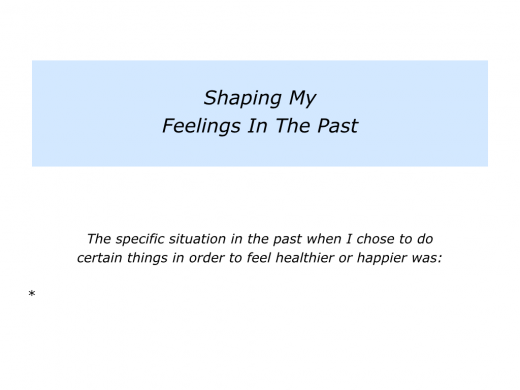
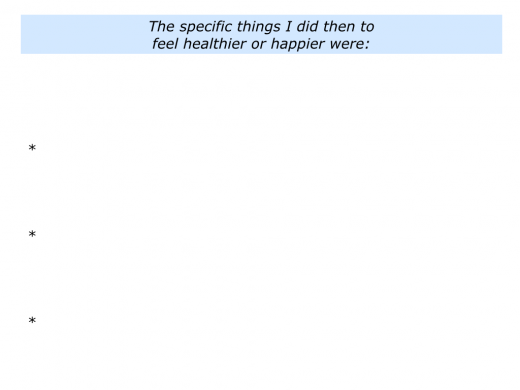
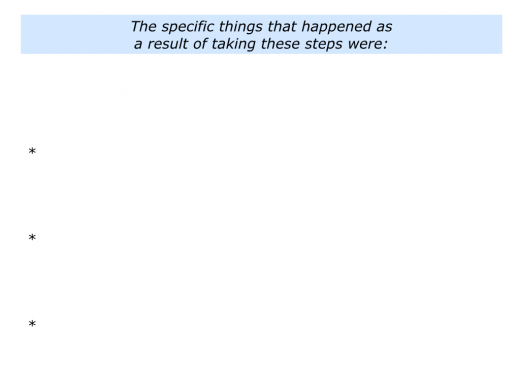
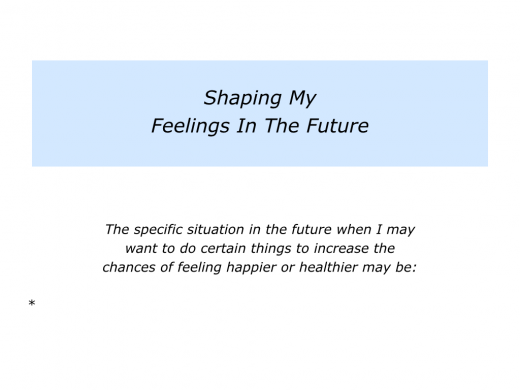
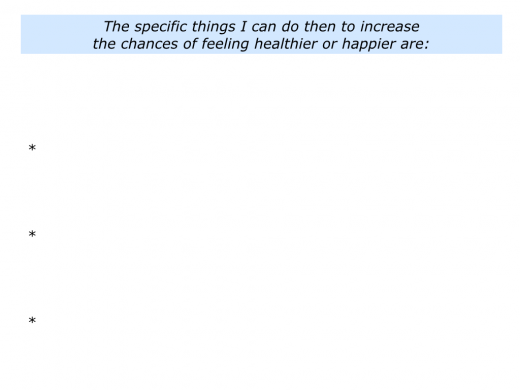
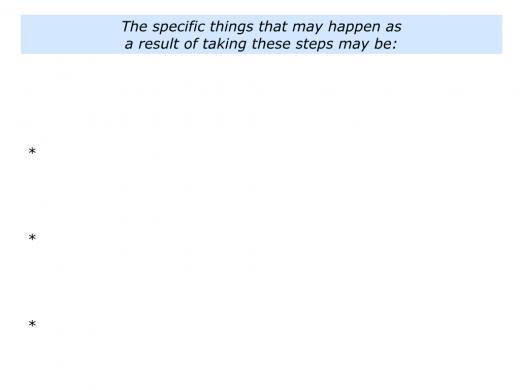




Leave a Reply